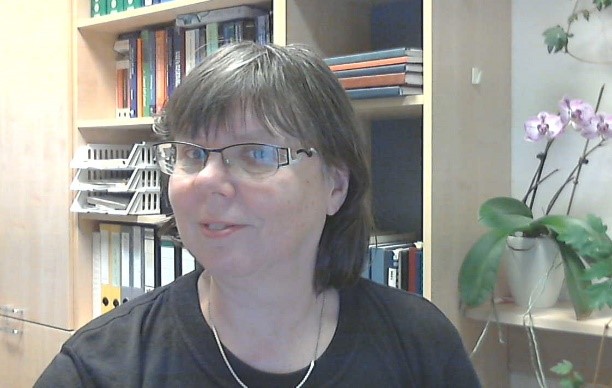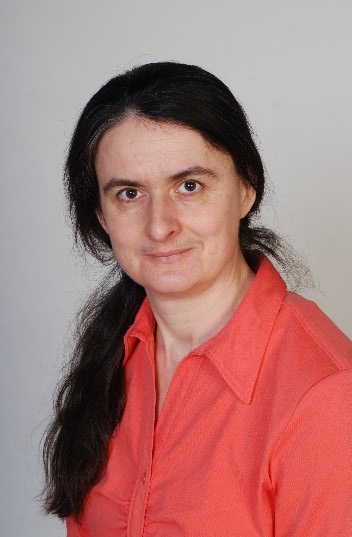Gender Equality Plan
Since December 2021, the Institute of Biophysics (IBP) has been the holder of the HR Excellence in Research Award, which it received from the European Commission. The IBP creates a working, educational and cultural environment in which the equal rights and dignity of all employees are respected. Ensuring equal opportunities for women and men in the workplace is important to achieve this goal. To oversee the implementation of this plan, the HR Award will be given to the Steering Committee.
The Gender Equality Plan focuses on the following areas:
- Reconciling employees' work and private lives
- Gender balance in leadership and decision-making
- Gender balance in recruitment and career advancement
- Measures against gender-based behaviour incompatible with social standards.
Successful women of our Institute
prof. RNDr. Jana Kašpárková, PhD.

In 1993, she completed her studies in Biochemistry at the Faculty of Science of Masaryk University in Brno (MU). In 1996, she completed her doctoral studies in the field of biophysics at the Faculty of Science of MU and the Institute of Biophysics of the Academy of Sciences of the Czech Republic, receiving a Ph.D. degree. Since 1996, she has been working at the Institute of Biophysics of the Czech Academy of Sciences in Brno as a researcher. Since 2008, she has also been working at the Faculty of Science of Palacký University in Olomouc.
In 2004, she was appointed associate professor at the Faculty of Science of Masaryk University, and in 2010, at the suggestion of Palacký University, she became a professor in the field of biophysics. She has supervised master's and doctoral students and taught advanced semester courses in master's and doctoral study programs at the Faculties of Science of Masaryk University in Brno and Palacký University in Olomouc. She is a member of the faculty councils of the doctoral study programs in Physics at Masaryk University and Biophysics at Palacký University.
Jana Kašpárková is engaged in research into the mechanism of action of effective antitumor metallopharmaceuticals at the molecular and cellular level. She has been the principal investigator of several domestic projects, and between 2001-2010, she received two prestigious foreign grants awarded by the Howard Hughes Medical Institute (HHMI). She has participated in organizing several important international scientific symposia and has been a member of the evaluation panels of the Grant Agency of the Czech Republic. For the period 2022-2026, she is nominated as a representative of the Czech Republic in the steering committee of the action focused on preparing models for immunotherapy of cancer diseases within the framework of European cooperation in scientific and technical research (EC/ESF COST). She is the author or co-author of original scientific works published in renowned international professional journals and chapters in professional monographs. Her works have been cited more than 6000 times (excluding self-citations).
Judit Šponer, PhD.

Judit Šponer, PhD. was born in Budapest, Hungary. She has graduated from Eötvös Loránd University, Budapest in 1993 as a chemist. After conducting her PhD. studies at the Structural Chemistry Research Group of the Hungarian Academy of Sciences in the topic of molecular structure determination using gas-phase electron diffraction, she earned her PhD degree from Budapest Technical University in 1996. From 1997 to 2001 she has been a junior scientist at the Catalysis Department of the J. Heyrovsky Institute in Prague, where she has been working on various problems related heterogeneous catalysis on zeolites. Starting from 2002 she is a senior scientist at the Department of Structure and Dynamics of Nucleic Acids at the Institute of Biophysics. Departing from theoretical analysis of key intermolecular interactions responsible for folding of RNA, her research focus has gradually shifted towards experimental problems related to the origin of life. Her studies on the role of formamide in the prebiotic synthesis of the building blocks of the first genetic molecules and on the non-enzymatic template-free polymerization of nucleotides are known not only for specialists working on the topic of the origins of life but also for the general public.
Since 2010 Judit Šponer has been the coordinator of several projects focusing on various aspects of the origin of life funded by the Czech Science Foundation, among which one of them was awarded by the “GAČR President’s award” in 2022. She has authored about 120 original publications in internationally recognized peer-reviewed journals and 5 book chapters which were cited about 5000 times (without autocitations).
prof. RNDr. Eva Bártová, Ph.D., DSc.

Eva Bártová graduated from the Masaryk University, Brno in 1991. In 1995, she received the Ph.D. (Department of Animal Physiology, Faculty of Science, Masaryk University and Department of Cytokinetics, Institute of Biophysics of the Academy of Sciences of the Czech Republic). In the years 1995–1996, she worked as an assistant at the Faculty of Medicine, Masaryk University, Brno, Department of Pathophysiology. Since 1997, she was employed and headed the Department of Molecular Cytology and Cytometry of the Institute of Biophysics of the Academy of Sciences of the Czech Republic, Brno. Since May 2017, she has been the director of the Institute of Biophysics of the Academy of Sciences of the Czech Republic, Brno. In 2010, Eva Bártová was appointed associate professor at the Faculty of Science at Masaryk University, and in 2024 she successfully passed the professorial process at Masaryk University. Eva Bártová led master's and doctoral students and teaches advanced semester courses in the master's and doctoral study programs at the Faculty of Science of Masaryk University in Brno. She is a member of the departmental councils of Masaryk University and since 2020 has been a member of EMBO.
Eva Bártová is interested in cellular and molecular biology, the study of chromatin structure and function, epigenetic processes with a focus on the histone code, and the analysis of DNA repair after UV damage and ionizing radiation.
Eva Bártová was the coordinator or investigator of many domestic and foreign projects, e.g.: EU project No. LSHG-CT-2003-503441, 2004-2007, 3D genome (coordinator Prof. Roel van Driel); EU, COST, No. TD09/05, 2009-2012. Epigenetics from Bench to Bedside; EU, Marie Curie project PIRSES-GA-2010-269156-LCS. 2011-2014. Study of protein dynamics in living cells after DNA damage (principal investigator); The Czech-Norwegian Research Program CZ09, project name: Nuclear architecture in the regulation of autophagy, DNA repair and gene expression (NuArch) No.: 7F14369 (principal investigator); The Czech-Norwegian Research Program CZ09, project name: Czech-Norwegian networking (CzeNoNet) No.: 7F16012 (principal researcher); EU, COST, grant: MC1406, 20015-2017. Epigenetic Chemical Biology (EPICHEM). She is the author or co-author of original scientific papers published in renowned international professional journals. Her work has been cited more than 2500 times.
prof. RNDr. Michaela Vorlíčková, DrSc.

Prof. RNDr. Michaela Vorlíčková, DrSc. studied Physics (biophysics) at the Faculty of Science of the MU (formerly UJEP) in Brno. After completing her master's degree, she was hired at the Institute of Biophysics of the AVČR, where she still works. Here she obtained the scientific degree CSc. and after the revolution DrSc. In 1992, she founded the Laboratory of CD Spectroscopy of Nucleic Acids at the IBP, where she educated a number of bachelor's, master's, and especially postgraduate students. In 2002, she completed her habilitation at the Faculty of Science of the MU in Brno, and in 2007 she was appointed a professor. She lectures special chapters on the biophysics of nucleic acids for master's and foreign PhD. students.Michaela Vorlíčková (MV) is a recognized scientific personality in the field of biophysical properties of DNA. Her results contributed to the current polymorphic view of this macromolecule. She was the first in the Czech Republic starting to use circular dichroic spectroscopy to systematic structural studies of nucleic acids. Due to its extraordinary sensitivity, technical ease of use and, above all, high informativeness, this method has become, next to NMR and crystallography, the most important and most frequently used method of studying nucleic acids and biomacromolecules in general, and dichrographs have become a standard equipment of molecular biology and biophysics laboratories. MV with her team wrote a number of basic papers on CD spectroscopy and nucleic acids, which are highly cited (e.g. an article of 2009 has >1300 citations).MV participated in pioneering research of various anomalous DNA arrangements different from the classical Watson-Crick model, such as left-handed DNA, parallel double helix, ordered single-strand helix and multi-stranded structures. Among the first in the world (Biophys J. 1997), she began to deal with DNA quadruplexes at the oligonucleotide level, which are currently intensively studied with regard to their biological importance.
MV was an investigator of 16 national grants (12PI, 4 coPI ), a project OPVVV (SYMBIT) financed by the ERDF, SCIEX (Scientific Exchange Programme between Switzerland and the New Member States of the EU), and a Fogarty International Research Collaboration, NIH, USA.
In 2015, MV was awarded by the Czech Academy of Sciences the G.J. Mendel Honorary Medal for Merits in Biological Sciences.
Implementation of the Gender Equality Plan
Action 1
Title: Gender balance in leadership and decision-making
Detailed information: After an introductory circle of a lecturer and participants, were introduced concepts such
as gender, gender stereotypes, socialization, and the possibility of avoiding stereotypes. Later the attention was paid to case studies: Advertising, Remuneration, Reconciliation of work and private life, Goods and services, (Sexual) harassment. An assessment of case studies of non-equal treatment took place in groups. Then the individual cases were discussed with members of other groups, as a tool for solving the cases was used a concept of a shared burden of proof. Following topics were introduced through a discussion of the specific circumstances of the individual cases: (1) Areas and grounds of discrimination protected by the Anti-Discrimination Act, (2) Direct discrimination, indirect discriminationIndirect discrimination, (3) (Sexual) harassment, (4) Persecution, instruction, incitement to discrimination, (5) Shared burden of proof. In the end, as a summary, the lecturer briefly focused on 2 general questions: (1) Why promote equality between women and men? (international and national legal obligations, existence of inequalities, public opinion, 5 arguments for gender equality) (2) How to promote equality between women and men. Participants were cooperative, informed, active. An interest was visible from the detailed discussion. The discussion was constructive and aimed at finding solutions to the often
complex problems that equal treatment brings. Discussed situations are repeatedly on the borderline between the law and ideas of each person about rules of human coexistence, on the borderline between work and private life. Through interaction and through the search for their own solutions to the case studies submitted, participants had the opportunity to experience the complexity of the agenda themselves. They were informed about possible solutions to non-equal treatment not only through sanction mechanisms, so-called ex post solutions, but also about the need for prevention and education
Lecturer: Mgr. et Mgr. Pavla Špondrová
Timing: June 22, 2022
Indicator(s)/Targets: Action had high priority for GEP.
Number of participants: 20
Action 2
Title: Annual meetings on gender issues at the institute
Detailed information: Every year, the director of the institute organizes meetings of BFÚ employees on gender issues, where issues related to possible discrimination, the possible existence of inequalities, the need to promote equality, and the rules of human coexistence are discussed. The participants expressed that they do not feel discrimination against women or men within the BFÚ.
Timing: end of each year
Number of participants: 30
Indicators/Targets: The number of participants corresponds to the number of workers who are interested in gender issues. The aim is to ensure a quick response of the institute's management in case of need.
Action 3
Title: Summer schools for children up to 10 years old
Detailed information: The events took place in two weeks, detailed information is given in HR Award Implementation, events 14.1 and 14.2. The aim of the events was, among other things, to contribute to gender balance in childcare.
Timing: first summer school 18.7.-22.7.2022, second summer school 8.8.-12.8.2022
Number of participants: 12 children, 15-20 mentors form IBP
Action 4
Title: Improved gender balance in leaderschip positions
Detailed information: Owing to the fact that there is ony 1 woman from 10 departments leaders, the management of the Institute recommended appointing a women as deputy heads of the departments. Thus, 8 women were appointed to this position. The current situation is that the ratio of women/men in the position of head of department/deputy head of department is 9/11, which is quite balanced. It should be noted that women prefer the position of deputy of the department leader due to less responsibility and workload.
Timing: 2022
Indicators/Targets: balances representation of women and men in leading positions
Action 5
Title: Equality between men and women
Detailed information: (1) the course was intended for everyone, (2) the course would focus on the topic of "gender stereotypes", how these stereotypes are harmful and in which areas they have a negative effect on both women and men; (3) some other potentially discriminatory cases were discussed; (4) space was set aside for explaining the principles of equal treatment as it follows from the anti-discrimination law.
Timing: April 5, 2023
Indicators/Targets: balances representation of women and men in leading positions
Action 6
Title: Summer school of biophysical sciences for children (6-12 years old) (photos see here: 1,2,3,4,5,7,8)
Detailed information: Detailed table with information on the activites and responsible wokers for all days is shown here.
Timing: 15.7.-19.7.2024
Responsible Unit: WG, management of the institute, responsible employees: Aleš Daňhel (danhel@ibp.cz), Jana Poláková, Hana Křivánková
Indicator(s)/Targets: Approximately 10 mentors from the IBP have organized the Summer school. Measurable indicator: the number of children participating/number of children registered: 7/9=78%. Action 6 had high priority for GEP.
Current Status: Completed
Action 7
Title: Course on Gender Case Studies (see here)
Detailed information:
The course represented continuation of previous courses on gender problems. It involved 4 cases described in detail by Mgr. Pavla Spondrova, where research aspects were taken into consideration. Groups of scientists looked after solution.
GAP Principles: 2, 4, 7, 28, 30, 31, 33, 38, 39
Timing: May 22, 2024, 9:30-11:30
Responsible Unit: Working Group, Steering Committee, director of the Institute
Indicator(s)/Targets: The course was available for all categories, women (w) and men (m): number of participants: 20 (R1:3w/3m, R2: 8w/2m, R3: 4w/0m, R4: 0). Measurable indicator: number of emploeyees interested/number of trained employees: approximately 20/20. High priority for HRS4R, average priority for institutional strategy.

